
 i_need_contribute
i_need_contribute

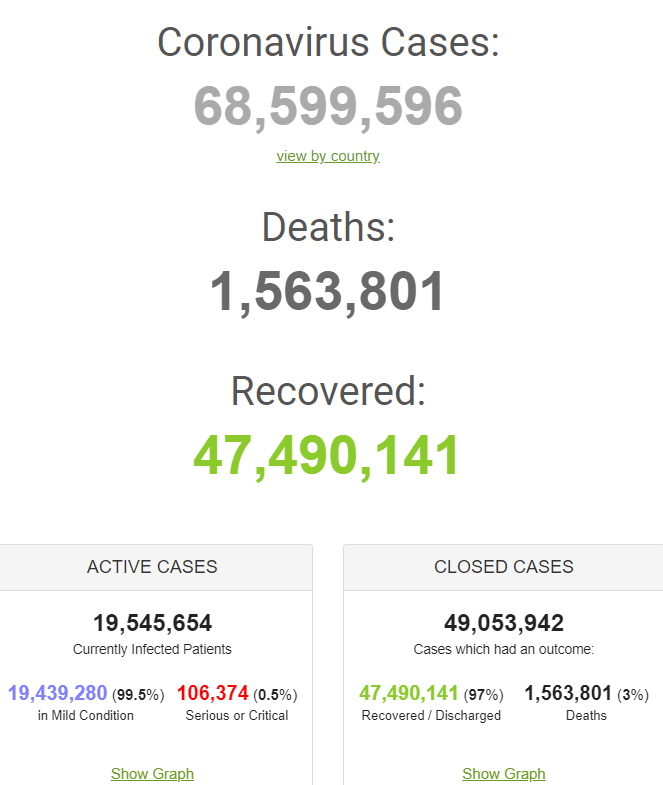
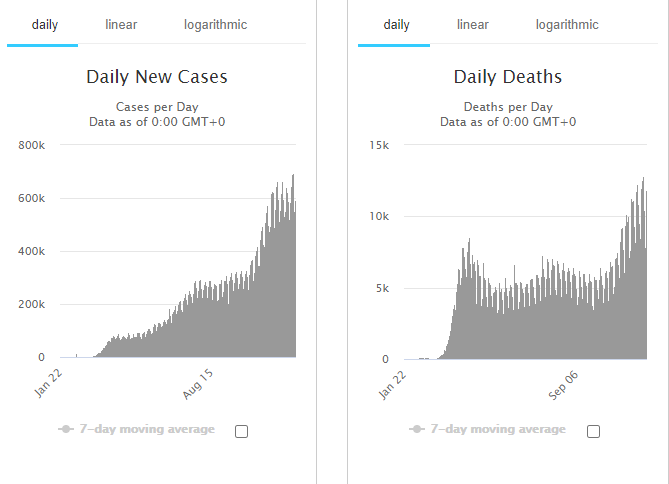
|
Country, |
Total |
New |
Total |
|
World |
68,557,414 |
+591,889 |
1,562,287 |
|
15,593,346 |
+209,756 |
293,445 |
|
|
9,735,975 |
+32,067 |
141,398 |
|
|
6,675,915 |
+47,850 |
178,184 |
|
|
2,515,009 |
+26,097 |
44,159 |
|
|
2,309,621 |
+13,713 |
56,352 |
|
|
1,757,394 |
+14,842 |
61,240 |
|
|
1,750,241 |
+12,282 |
62,033 |
|
|
1,715,700 |
+6255 |
46,646 |
|
|
1,469,919 |
+3,610 |
40,009 |
|
|
1,384,610 |
+7,510 |
38,158 |
|
|
1,218,325 |
+18,319 |
20,161 |
|
|
1,182,249 |
+6,399 |
110,074 |
|
|
1,076,180 |
+8,312 |
20,592 |
|
|
1,062,397 |
+11,023 |
50,917 |
|
|
976,621 |
+1,505 |
36,401 |
|
|
893,630 |
+33,198 |
15,314 |
|
|
832,758 |
+10,811 |
13,928 |
|
|
821,889 |
+4,011 |
22,432 |
|
|
592,615 |
+859 |
17,386 |
|
|
586,842 |
+5,292 |
18,000 |
|
|
570,437 |
+6,146 |
9,775 |
|
|
568,138 |
+2,123 |
12,477 |
|
|
563,534 |
+1,392 |
15,680 |
|
|
556,927 |
+5,848 |
9,136 |
|
|
524,675 |
+7,439 |
12,660 |
|
|
481,945 |
+2,202 |
6,906 |
|
|
442,777 |
+1,392 |
8,670 |
|
|
429,035 |
+5,981 |
12,867 |
|
|
423,179 |
+2,885 |
8,487 |
|
|
384,088 |
+2,900 |
6,370 |
|
|
359,115 |
+193 |
5,989 |
|
|
348,285 |
+1,488 |
2,932 |
|
|
327,976 |
+2,905 |
5,122 |
|
|
308,070 |
+2,377 |
4,002 |
|
|
256,367 |
+2,219 |
6,120 |
|
|
247,131 |
+3,062 |
3,162 |
|
|
243,377 |
+1,382 |
1,637 |
|
|
234,027 |
+7,818 |
2,062 |
|
|
198,752 |
+508 |
13,794 |
|
|
181,166 |
+1,936 |
3,241 |
|
|
178,837 |
+1,260 |
596 |
|
|
169,649 |
+4,673 |
1,576 |
|
|
168,165 |
+3,980 |
5,156 |
|
|
163,929 |
+1,862 |
2,382 |
|
|
154,852 |
+2,613 |
2,298 |
|
|
154,152 |
+4,387 |
1,713 |
|
|
150,602 |
+1,649 |
1,222 |
|
|
Dominican |
149,630 |
+492 |
2,347 |
|
147,430 |
+1,009 |
1,846 |
|
|
145,657 |
+97 |
8,997 |
|
|
144,900 |
+301 |
900 |
|
|
142,928 |
+584 |
2,372 |
|
|
140,203 |
+117 |
239 |
|
|
139,135 |
+1,039 |
1,136 |
|
|
137,653 |
+670 |
2,088 |
|
|
126,473 |
+799 |
4,286 |
|
|
125,325 |
+210 |
1,454 |
|
|
119,281 |
+434 |
6,813 |
|
|
119,232 |
+1,949 |
1,046 |
|
|
119,204 |
+1,709 |
2,460 |
|
|
118,045 |
+1,324 |
3,194 |
|
|
114,266 |
+531 |
1,766 |
|
|
111,707 |
+684 |
2,950 |
|
|
105,445 |
+1,116 |
3,668 |
|
|
105,384 |
+480 |
928 |
|
|
101,739 |
+1,308 |
2,151 |
|
|
101,109 |
+1,351 |
867 |
|
|
94,799 |
+2,150 |
901 |
|
|
89,421 |
+698 |
1,887 |
|
|
89,416 |
+591 |
2,539 |
|
|
89,100 |
+521 |
1,545 |
|
|
88,294 |
+183 |
343 |
|
|
87,986 |
+889 |
1,255 |
|
|
87,936 |
+1,648 |
1,862 |
|
|
86,646 |
+12 |
4,634 |
|
|
77,426 |
+1,388 |
673 |
|
|
75,690 |
+295 |
1,301 |
|
|
75,306 |
+1,012 |
388 |
|
|
74,682 |
+214 |
2,097 |
|
|
74,206 |
+153 |
611 |
|
|
70,195 |
+550 |
1,182 |
|
|
69,452 |
+1,120 |
1,977 |
|
|
58,285 |
+12 |
29 |
|
|
52,500 |
+226 |
326 |
|
|
44,436 |
+753 |
936 |
|
|
40,551 |
+206 |
1,168 |
|
|
39,163 |
+460 |
361 |
|
|
39,153 |
+591 |
549 |
|
|
38,864 |
+388 |
369 |
|
|
5,326 |
+1 |
117 |
|
|
4,984 |
+18 |
45 |
|
|
4,126 |
+19 |
60 |
|
|
1,377 |
+10 |
35 |
Retrieved from: https://www.worldometers.info/coronavirus/
Analysis from CNN's Zachary B. Wolf
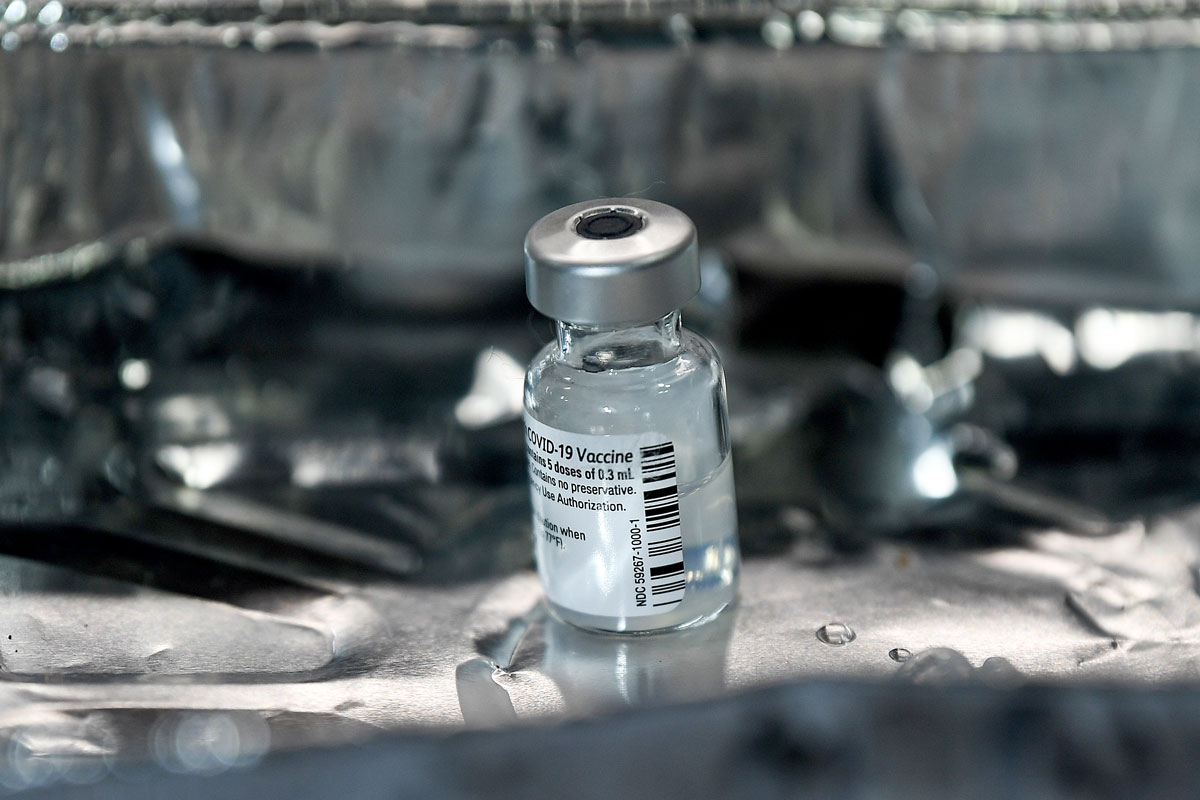
A phial of Pfizer-BioNTech Covid-19 vaccine is seen on a tray at the Louisa Jordan Hospital in Glasgow on Dec. 8 as the UK begins its biggest vaccination program. Jeff J Mitchell/Pool/AFP/Getty Images
In the United Kingdom, people are getting Pfizer's Covid vaccine. The idea that we've officially entered the vaccine stage of this thing in the Western Hemisphere actually made me do a fist pump this morning. This is huge.
The process looks very organized in the UK, where they're converting sports stadiums to vaccine delivery locations for the masses. That is in part because in the UK they have the National Health Service, which means structure for everyone, ultimately, to get stuck. (Prime Minister Boris Johnson is waiting for his place in line, he said today.)
Here in the US, there is second-guessing of a Trump administration decision not to buy more vaccine from Pfizer, which is first out of the gate in the UK. It's also likely to be first in the US, but did not take part in all of Operation Warp Speed, the US vaccine effort. (Note: A former board member for Moderna, a Pfizer competitor, leads Operation Warp Speed.)
And there is no clear idea who will get the vaccine when in the US, although an executive order should be coming from President Donald Trump on that.
Here, there's a profit motive to health care and it's not clear to me that everyone will get a dose for free. It's also not clear who will want to take it. An administration official said Monday that by the end of March, 100 million Americans could have a vaccination -- everyone who wants it. There are more than 300 million people in this country.
From CNN's Junko Ogura in Tokyo
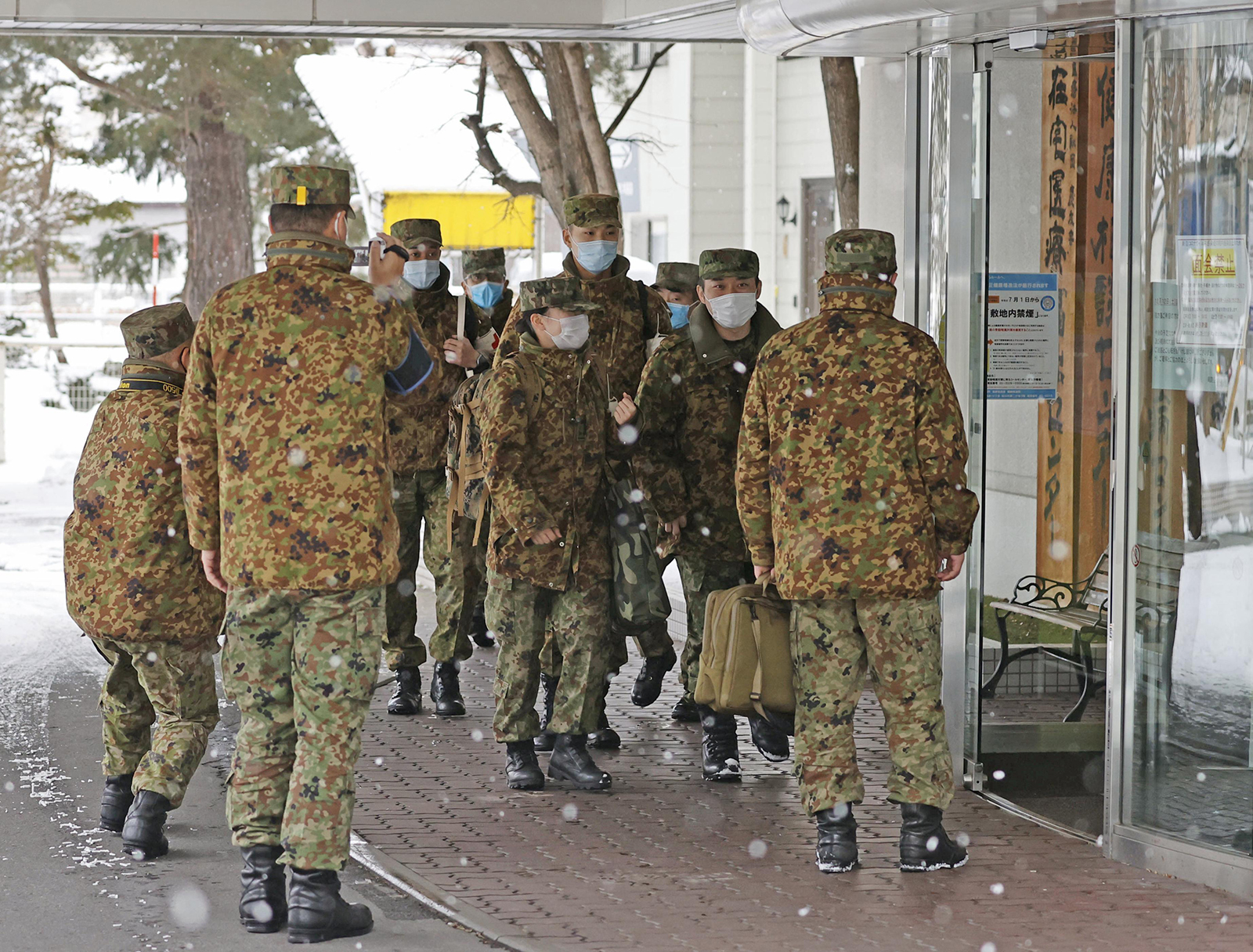
Nurses from the Japan Self-Defense Forces arrive at Yoshida Hospital in Asahikawa, Hokkaido, on Dec. 9. Kyodo News/Getty Images
Japan will send doctors and nurses from other prefectures to Osaka and Hokkaido, both of which have been hit hard by Covid-19, to help with the strain on medical staff, the National Governors' Association has announced.
The association said 46 nurses from several prefectures will be sent to Osaka and Hokkaido to help fight Covid-19.
The Ministry of Health on Monday also began sending 60 medical personnel to the areas to assist and on Tuesday, Defense Minister Nobuo Kishi ordered the Japan Self-Defense Forces to send nurses to the coronavirus hotspot of Asahikawa city, Hokkaido to help deal with a surge in infections.
More than 70% of hospital beds are occupied in Osaka, with 160 people in critical condition on respirators, according to Osaka's prefectural government. The prefecture reported 258 new cases on Tuesday, bringing its total to 22,993.
Hokkaido reported 204 new cases and nine deaths from Tuesday. Asahikawa city reported a record daily increase with 50 new cases and six new deaths.
Nationwide, Japan reported 2,154 new coronavirus infections and 38 deaths from Tuesday. The country's total number of cases stands at 166,552, including 2,433 fatalities.
From CNN's Eliza Mackintosh
The United Kingdom has begun administering the first doses of the Pfizer/BioNTech vaccine outside clinical trials, launching a sprawling public health campaign to vaccinate tens of millions of people in just a matter of months. It marks a significant turning point in the fight against Covid-19, months into a pandemic that has left more than 1.5 million dead.
Margaret "Maggie" Keenan, who turns 91 next week, became the first person in the world to receive an authorized, fully-vetted coronavirus vaccine.
"It's the best early birthday present I could wish for," Keenan said after receiving the jab in Coventry, England, dressed in a festive "Merry Christmas" T-shirt. "It means I can finally look forward to spending time with my family and friends in the New Year after being on my own for most of the year."
The second patient to receive a shot was an 81-year-old man named William Shakespeare (yes, you read that right).
Keenan and Shakespeare were among a handful of people across Britain — those aged over 80, nursing home staff and health care workers — who were administered doses of the Pfizer/BioNTech vaccine on Tuesday morning, a week after the UK leapfrogged the rest of Europe and the United States to become the first Western nation to approve it.
The process, which is complicated by the need to store the Pfizer/BioNTech vaccine in ultracold conditions, will be closely watched from around the globe. The speed with which UK regulators approved the vaccine raised questions in some quarters. But Saffron Cordery, deputy chief executive of NHS Providers, said the process had been "incredibly robust."
Other nations are not far behind the UK. The US regulator, the Food and Drug Administration (FDA), has scheduled a meeting of its vaccine advisory committee on Thursday to discuss Pfizer/BioNTech's emergency authorization application. It will meet again on December 17 to consider the application for Moderna's vaccine candidate.
Meanwhile, vaccination centers across Moscow started to distribute Russia's Sputnik vaccine on Saturday, initially to groups such as teachers, health professionals, and municipal services workers, after Russian President Vladimir Putin ordered large-scale vaccination to begin across the country.
Retrieved from: https://edition.cnn.com/world/live-news/coronavirus-pandemic-12-09-20-intl/index.html
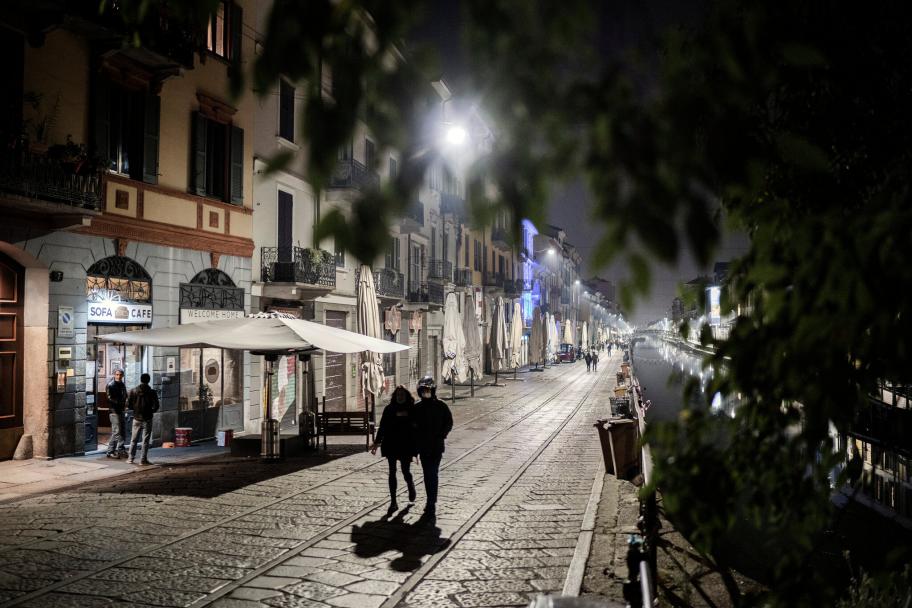
Lombardy is one of the regions in Italy that will be going into lockdown.Credit...Alessandro Grassani for The New York Times
The Italian government announced Wednesday night that it would lock down a significant portion of the country, including the northern regions that are its economic engine, in an effort to stop a resurgent wave of coronavirus infections.
Prime Minister Giuseppe Conte said the measures, the most drastic since the nationwide lockdown in March, would take effect on Friday and will seal off six regions in the country’s deeply infected north and highly vulnerable, and poorer, south.
“The situation is particularly critical,” Mr. Conte said at an evening news conference. He said the virus was moving at a “strong and even violent” pace.
Across Europe, efforts to halt a second wave of cases with piecemeal measures are being replaced by far stricter rules — and hurried efforts to bolster health systems that could quickly reach capacity in the coming weeks.
Starting Thursday, England will be under a second lockdown. Poland will shut schools and shops this weekend, and Lithuania will enter a full lockdown. Switzerland has called in the army to bolster hospitals. And France’s health minister is pushing to extend a state of emergency until February.
In Italy, the new measures will ban residents of the six regions from crossing borders except for work, health or other “situations of necessity,” Mr. Conte said. Movement within the regions will also be strictly limited. Bars and restaurants will be closed in all of the regions and shops selling nonessential goods will be closed in most of them.
Three of the regions span the country’s northwest and include Lombardy, which is the home of Italy’s financial capital, Milan, Piedmont and Aosta Valley. The southern regions are Calabria, Puglia and the island of Sicily.
Mr. Conte said the restrictions, which have triggered fierce opposition from business groups, restaurants and many citizens exasperated with government limits on their freedom, were being put in place because “there is a high probability that some regions will exceed the critical limits in intensive care units” in the coming weeks.
“We necessarily have to intervene,” he said.
The country will be essentially divided into three zones: red, orange and yellow, each with its own restrictions. The government will make those assessments on a weekly basis.
The announcement adds specifics to a new government decree, announced earlier on Wednesday, which imposed a 10 p.m. curfew around the country and closed museums, high schools and, on the weekend, shopping malls. Mr. Conte also “strongly recommended” that Italians stay home during the day, but deferred the decision to establish local lockdowns to the country’s health minister and the regional governors.
Mr. Conte said he had chosen a more targeted approach rather than a blanket lockdown because nationwide measures might be ineffective for the most infected areas and too draconian for places with fewer cases.
In Britain, Mr. Johnson spoke before Parliament on Wednesday, saying there was no alternative to a monthlong lockdown if a “medical and moral disaster” was to be avoided. For weeks, Mr. Johnson had resisted such drastic measures, rejecting calls from scientists who advise the government, and from the opposition Labour Party, for an earlier but shorter lockdown.
Lawmakers voted 516-38 to approve the rules, despite a rebellion from within Mr. Johnson’s Conservative Party.
Britain has been the worst-hit country by the pandemic in Europe, with more than 60,000 deaths.
London was bustling with shoppers hours before the new rules took effect. Stores, restaurants, pubs and other nonessential businesses must close for a month; schools will remain open. People will be asked to stay home unless they are needed at work, or out to buy food or exercise.
Germany and France, which had failed to contain the virus with piecemeal measures, have also reimposed nationwide lockdowns.
Switzerland called on the army to support its medical services on Wednesday as the daily number of virus cases hit a new peak. The Swiss cabinet said it agreed to deploy up to 2,500 military personnel to support testing, care and transport services. Switzerland recorded more than 10,000 cases on Wednesday, a single-day record, and 73 deaths.
Lithuania said it would impose a nationwide lockdown as of Friday, after the number of new cases tripled in recent weeks, while the prime minister of Denmark, and most of the government, went into quarantine after the justice minister tested positive for the virus.
Poland stopped short of a national lockdown, but announced new restrictions on Wednesday. Cultural institutions and nonessential shops in commercial centers must close on Saturday, and the number of customers allowed into other shops will be limited. Hotels will only be allowed to accept business travelers, and all schools starting at first grade will switch to online learning.
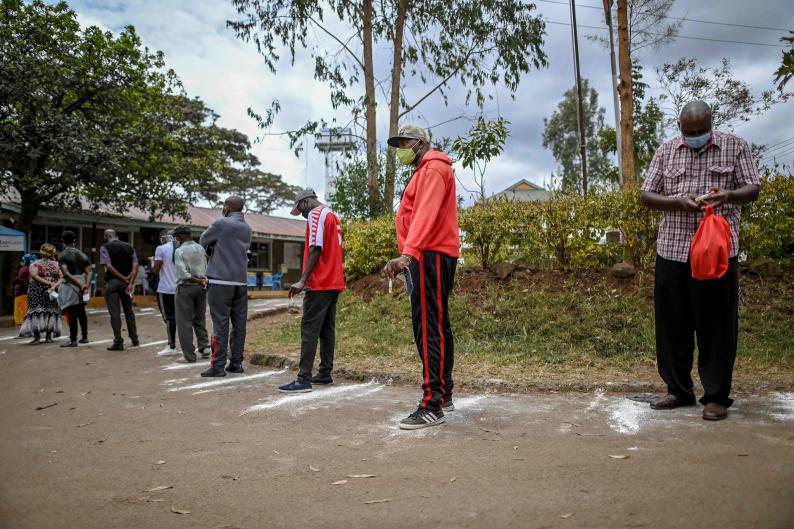
Lining up for coronavirus testing in Kenya’s capital, Nairobi, last month.Credit...Tony Karumba/Agence France-Presse — Getty Images
Kenya’s president introduced a raft of new measures to curb the spread of the coronavirus on Wednesday, after admitting that the rising number of cases was a reversal of the gains achieved in the early months of the pandemic.
The East African nation eased containment measures in late September, reopening schools, churches and bars with strict protocols in place. But the laxity in applying the rules, especially in the transport, entertainment and hospitality industries, as well as at political meetings and rallies, led to a sharp rise in virus cases.
In October alone, President Uhuru Kenyatta said the country recorded more than 15,000 new cases of Covid-19 and approximately 300 deaths. Kenya has so far recorded at least 57,000 cases of the virus and more than 1,000 deaths, according to a Times database.
“October has gone down as the most tragic month in our fight against Covid,” he said in a televised speech on Wednesday.
Mr. Kenyatta announced the suspension of political gatherings for two months and ordered that all bars and restaurants be closed by 9 p.m. He also extended the nationwide curfew to Jan. 3 and moved back the start of the curfew each night to 10 p.m.
All government employees over the age of 58 and those who are immunocompromised will be asked to work remotely, Mr. Kenyatta said. All in-person learning will resume in January 2021, even though dozens of students and teachers tested positive after schools were partially reopened last month.
Earlier in the day, Wycliffe Oparanya, the chairman of the Council of Governors, said that as many as 12 of the country’s 47 counties had not attained the minimum 300-bed capacity stipulated to accommodate virus patients. He also said 11 counties had fewer than five intensive care unit beds in their isolation facilities, and warned of an increasing number of doctors getting infected by the virus.
Mr. Kenyatta said Kenya was “now staring at a new wave of this pandemic” and urged citizens to observe the new rules.
“The most fragile point in any war happens at the point when victory is in sight,” Mr. Kenyatta said. “This is why I emphasized that to win the overall war, the citizens have to exercise their civic duty and responsibility, especially in observing the Covid protocols.”
In other developments around the world:
Algeria’s secretive presidency confirmed that the mysterious illness that led to the hospitalization of President Abdelmadjid Tebboune in Germany last week was the coronavirus, The Associated Press reported. The presidency said the health of Mr. Tebboune, 74, was “gradually improving.” It was the first time that officials explicitly mentioned Covid-19 in connection with the Oct. 28 hospitalization.
Hungary’s minister of foreign affairs and trade tested positive for the virus after arriving in Thailand for an official visit, Thai and Hungarian officials said Wednesday. The Thai health minister Anutin Charnvirakul said Peter Szijjarto and his 12-member delegation were tested after their arrival from Cambodia, but only the foreign minister was found to be infected, The Associated Press reported.
Retrieved from: https://www.nytimes.com/live/2020/11/04/world/covid-19-coronavirus-updates/kenya-extends-a-curfew-and-bans-political-gatherings-as-cases-rise
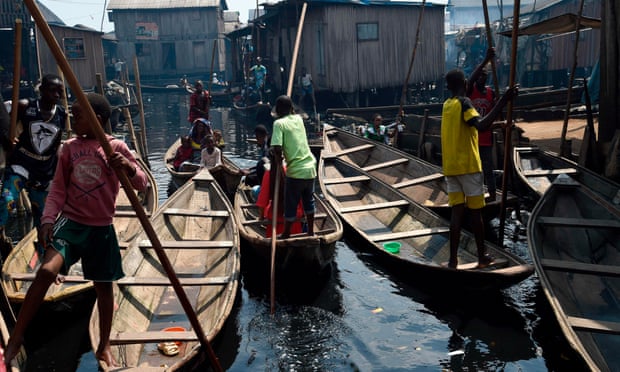
The Makoko riverine slum settlement in Lagos, Nigeria. Campaigners found 67 lower income countries risk being left behind as rich countries plot an escape from the pandemic. Photograph: Pius Utomi Ekpei/AFP/Getty Images
Nine out of 10 people in 70 low-income countries are unlikely to be vaccinated against Covid-19 next year because the majority of the most promising vaccines coming on-stream have been bought up by the west, campaigners have said.
As the first people get vaccinated in the UK, the People’s Vaccine Alliance is warning that the deals done by rich countries’ governments will leave the poor at the mercy of the rampaging virus. Rich countries with 14% of the world’s population have secured 53% of the most promising vaccines.
Canada has bought more doses per head of population than any other – enough to vaccinate each Canadian five times, said the alliance, which includes Amnesty International, Frontline AIDS, Global Justice Now and Oxfam.
“No one should be blocked from getting a life-saving vaccine because of the country they live in or the amount of money in their pocket,” said Anna Marriott, Oxfam’s health policy manager.
“But unless something changes dramatically, billions of people around the world will not receive a safe and effective vaccine for Covid-19 for years to come.”
Supplies of the Pfizer/BioNTech vaccine, approved in the UK last week, will almost all go to rich countries – 96% of doses have been bought by the west. The Moderna vaccine uses a similar technology, which also is claimed to have 95% efficacy, and is going exclusively to rich countries. The prices of both vaccines are high and access for low-income countries will be complicated by the ultra low temperatures at which they need to be stored.
By contrast, the Oxford University/AstraZeneca vaccine, which has 70% efficacy, is stable at normal fridge temperatures and the price has been set deliberately low for global access. The manufacturers have said 64% of doses will go to people in the developing world. The campaigners applaud this commitment, but said one company alone cannot supply the whole world. At most Oxford/AstraZeneca can reach 18% of the world’s population next year.
The alliance has used data from science information and analytics company Airfinity to analyse the global deals with the eight leading vaccine candidates. They found that 67 low and lower middle-income countries risk being left behind as rich countries move towards their escape route from the pandemic. Five of the 67 – Kenya, Myanmar, Nigeria, Pakistan and Ukraine – have reported nearly 1.5 million cases between them.
The campaigners want Covid vaccine manufacturers to share their technology and intellectual property through the World Health Organization Covid-19 Technology Access Pool. That would allow billions more doses to be made at low prices for the developing world. AstraZeneca/Oxford, Moderna and Pfizer/BioNTech have received more than $5bn of public funding to develop their vaccines, they said, which means they have a responsibility to act in the global public interest.
“Rich countries have enough doses to vaccinate everyone nearly three times over, whilst poor countries don’t even have enough to reach health workers and people at risk,” said Dr Mohga Kamal Yanni, from the People’s Vaccine Alliance.
“The current system, where pharmaceutical corporations use government funding for research, retain exclusive rights and keep their technology secret to boost profits, could cost many lives.”
Steve Cockburn, Amnesty International’s head of economic and social justice, said: “The hoarding of vaccines actively undermines global efforts to ensure that everyone, everywhere can be protected from Covid-19. Rich countries have clear human rights obligations not only to refrain from actions that could harm access to vaccines elsewhere, but also to cooperate and provide assistance to countries that need it.”
New York City is reopening some of its public schools Monday in the teeth of a worsening coronavirus outbreak.
The decision to do so reflects changing public health thinking around the importance of keeping schools operating, particularly for young students, and the real-world experience of over two months of in-person classes in the city’s school system, the nation’s largest.
Schools around the country have had to make the difficult decision of when to close and what metrics to follow, with some staying open amid local positivity rates in the teens and others using low single-digit thresholds.
Of the nation’s 75 largest public school districts, 18 have gone back to remote learning in the past month, according to data compiled by the Council of the Great City Schools and reported in The Wall Street Journal.
In California, many of the biggest school districts were already closed before new restrictions took effect on Sunday in three regions of the state. The new restrictions include stay-at-home orders, but do not require schools that had reopened to close again (an earlier version of this item incorrectly said they do). In the last week, California has reported more than 150,000 new cases, a record for all states.
Decisions to shutter schools have often been made on the local level and in inconsistent ways. Some schools have “paused” for short periods of time — as was the case in dozens of Central Texas districts or recently in Delaware, at the governor’s suggestion. Others have opted for blended learning with some days in school and some days remote.
Many have endured jarring periods of closing, opening and closing again. All of the solutions seem to be leading to burnout, instability and turmoil. New York City students, parents and teachers have felt their own whiplash, from a full shutdown before Thanksgiving to a partial reopening less than three weeks later.
Mayor Bill de Blasio has committed himself to keeping schools open, his aides say, and has started with elementary schools and those for students with severe disabilities. (About 190,000 children in the grades and schools the city is reopening this week would be eligible.)
Three of the country’s largest districts — in Birmingham, Ala., Tulsa, Okla., and Wichita, Kan. — made the opposite decision and closed over the past week. In Birmingham, the superintendent said the pandemic was “drastically impacting our community and our schools.” In Tulsa, two public school employees died recently after testing positive for the virus. And several of Wichita’s public schools had so many staff members quarantined that they could hardly cover vacancies by the time the district decided to close, the superintendent said.
The United States has diverged from other countries around the world in closing schools but leaving indoor dining and bars open. Many parents have criticized that situation, saying that risks of infection are higher in restaurants and bars and that it prioritizes the economy over education. Across Europe and Asia, students, especially very young ones, have largely continued going to school while other parts of daily life have shut down.
While Mr. de Blasio’s decision was applauded by many parents, there is no guarantee that the pattern of chaos that they have faced will abate as the fall turns to winter. New York City’s rules for handling positive cases all but guarantee frequent and sudden closures of individual classrooms and school buildings.
And it remains unclear whether the city will be able to reopen its middle and high schools to in-person learning any time soon.
One thing that could hamper the city’s efforts, officials cautioned, is a truly rampant second wave in New York.
The test positivity rate has only increased since the city closed schools, and the seven-day rolling average rate exceeded 5 percent last week. Hospitalizations have quickly mounted. Still, Mr. de Blasio said on Monday that “the schools in this city are among the safest places to be.” He noted that later this week the city planned to reopen some schools on Staten Island, even though the borough has seen positive infection test rates surge recently.
Retrieved from: https://www.theguardian.com/society/2020/dec/09/nine-out-of-10-in-poor-nations-to-miss-out-on-inoculation-as-west-buys-up-covid-vaccines
Germany inched towards stricter measures to curb the spread of the coronavirus, as an eastern region said it would close schools and most businesses and the health minister warned a partial lockdown had not stopped the disease.
Europe’s biggest economy is struggling to squash new infections in a second wave of Covid-19 that is both proving far more difficult to tame than the first one and extracting a heavier human toll as daily deaths hit record highs.
The governor of the eastern state of Saxony, which has the highest seven-day incidence rate per 100,000 residents anywhere in Germany, said schools and non-essential businesses will be shut from 14 December as hospitals struggle to take in patients. Saxony governor, Michael Kretschmer, said:
The situation in hospitals is not only tense, it is extremely dangerous at many locations, partly because a large number of beds are occupied by Covid-19 patients.
The federal health minister, Jens Spahn, said existing measures such as closing gyms, restaurants, hotels and leisure venues, as well as limits on the number of people in shops and at private gatherings, were not enough to reverse the tide. He told the public broadcaster Phoenix:
A short and comprehensive approach to really make a difference is probably more successful.
If we don’t get there within the next one or two weeks until Christmas, we have to discuss it,” he added, referring to stricter measures that may well be similar to those approved in Saxony.
Here are the key developments from the last few hours:
· Nine out of 10 people in 70 low-income countries are unlikely to be vaccinated against Covid-19 next year because the majority of the most promising vaccines coming on-stream have been bought up by the west, campaigners have said.
· US coronavirus cases crossed the 15 million mark. Record cases in at least three states - Arizona, Alabama and Ohio - pushed the cumulative case load to over 15 million, according to a Reuters tally of state and county data.
· UK’s science chief warned Britons may still need masks next winter. People in the United Kingdom may still be wearing face masks in a year’s time despite the country’s national vaccination programme getting under way, the UK’s chief scientific adviser, Patrick Vallance, told the Telegraph. “It may be that next winter even with vaccination we need measures such as masks in place,” he said.
· Kim Jong-un’s influential sister has launched a stinging verbal attack on South Korea’s foreign minister for questioning North Korean claims that the country does not have a single case of Covid-19. Kim Yo-jong, the North Korean leader’s younger sister, described the comments by Kang Kyung-wha as “reckless” and accused her of seeking to damage already strained ties between Pyongyang and Seoul.
· Rudy Giuliani is expected to leave hospital on Wednesday. US president Donald Trump’s lawyer said he is feeling better after contracting Covid-19 and expects to leave the hospital on Wednesday.
· South Korea reported its second-highest cases of pandemic so far. South Korea reported 686 new coronavirus cases on Wednesday as it battles a third wave of infection that is threatening to overwhelm its medical system. The daily tally was the second-highest since the start of the pandemic, according to the Korea Disease Control and Prevention Agency. New cases have been consistently around 600 over the past week.
· Thailand will deploy drones and increase military patrols along its border with Myanmar following a small cluster of cases linked to people crossing undetected into the country. At least 19 cases of the coronavirus have been linked to people passing over the border without undergoing mandatory quarantine. Health workers have raced to trace hundreds of contacts, while some schools have also been closed as a precaution.